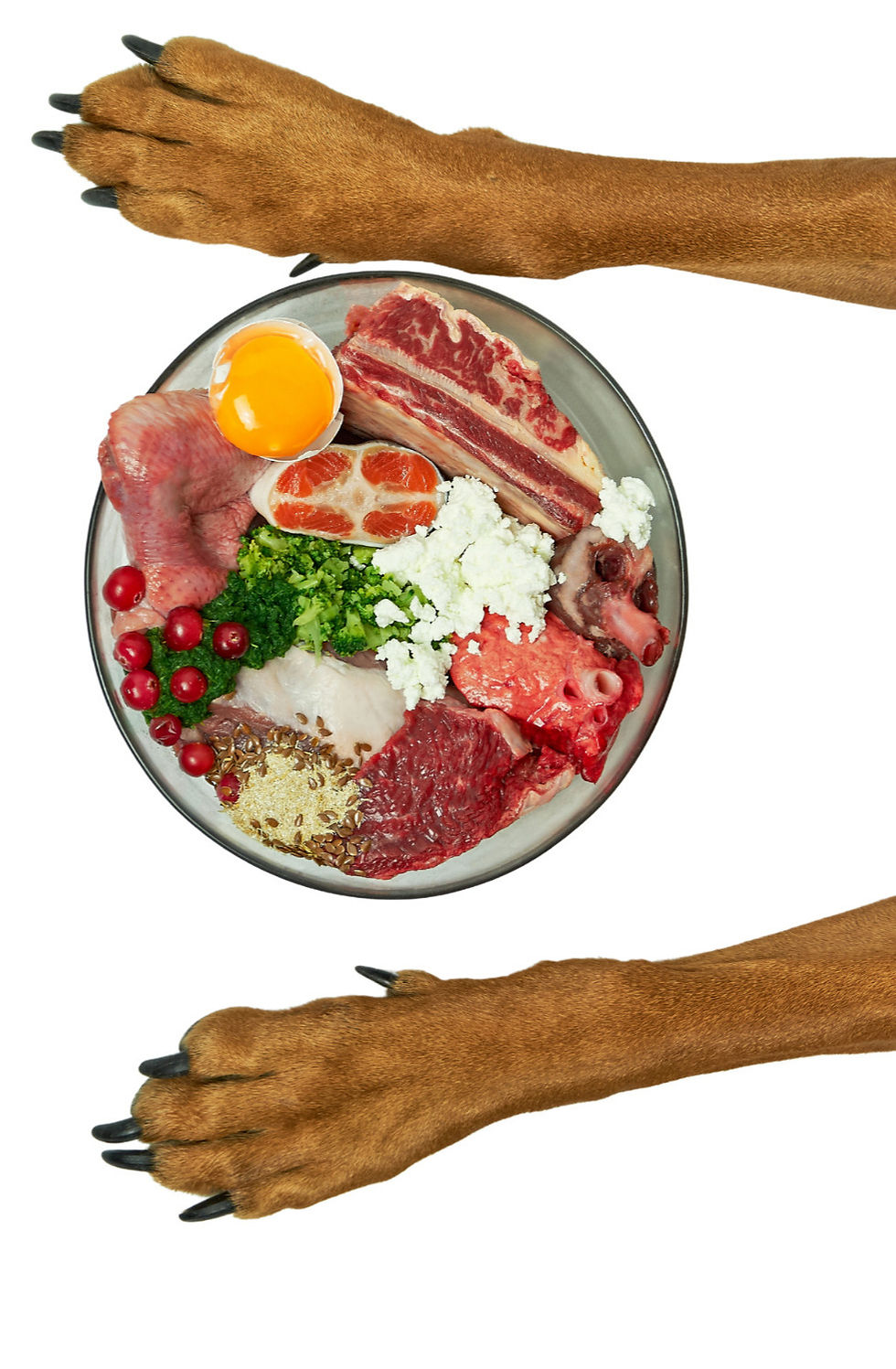THE ULTIMATE GUIDE TO CHOOSING THE BEST DOG FOOD
- adriennmolnar85
- Apr 23
- 4 min read
Updated: Sep 17

Choosing the best dog food for your dog can feel overwhelming with so many options available. That’s why I created this ultimate guide to dog food, based on over a decade of experience working with dogs, researching nutrition, and personally testing different brands. In this guide, I break down the various types of dog food—kibble, wet food, raw diets, fresh human-grade meals, cold-pressed options, and more. For each type, I provide a clear overview, the pros and cons, and my top personal recommendation, complete with a link to purchase. Some of these links are affiliate links, which means I may earn a small commission if you buy through them—at no extra cost to you. My goal is to help you make the best choice for your pup’s health and happiness!
What Makes a Balanced Diet for Dogs?
A well-balanced diet is crucial for your dog's health, longevity, and happiness. While specific dietary needs vary depending on age, breed, and activity level, a general breakdown of a healthy canine diet includes:

Protein: 18-30% (Higher for active and working dogs)
Fats: 10-20% (Essential for energy and a healthy coat)
Carbohydrates: 30-50% (Should come from quality sources like vegetables and whole grains)
Fiber: 2-5% (Aids digestion and gut health)
Vitamins & Minerals: Essential for immune function, bone health, and overall well-being
Now, let’s dive into the different types of dog food, their benefits, and the best brands available.
Kibble (Dry Dog Food)
Kibble is the most common type of dog food. It's convenient, cost-effective, and has a long shelf life. It is made by cooking and extruding ingredients into dry, bite-sized pieces.

Pros
✔️ Affordable and widely available
✔️ Easy to store and portion
✔️ Helps maintain dental health by reducing plaque
Cons
❌ May contain fillers and artificial additives
❌ Lower moisture content can lead to dehydration
❌ Some brands use lower-quality protein sources
Top Brands
Orijen (High-protein, grain-free options)
Acana (Quality ingredients, no artificial additives)
Wellness Core (Nutrient-dense and high in protein)
Wet Dog Food
Wet food is made with high moisture content (around 70-80%) and typically includes meat, vegetables, and grains in a gravy or pate form.

Pros
✔️ High moisture content supports hydration
✔️ Easier to eat for senior dogs and picky eaters
✔️ Usually contains fewer preservatives than kibble
Cons
❌ More expensive than kibble
❌ Shorter shelf life once opened
❌ Can be messy and require refrigeration
❌ Oral health requires more attention due to reduced chewing
Top Brands
Lily's Kitchen Organic Wet Food (High-quality natural ingredients and no by-products)
Forthglade Grain-Free Wet Food (Rich in protein and omega fatty acids)
Naturediet - Purely Wet Dog Food (92% meet and all natural ingredients)
Raw Dog Food (BARF & Prey Model)
Raw diets consist of uncooked meats, bones, organs, and sometimes vegetables. There are two main types: BARF (Biologically Appropriate Raw Food) and the Prey Model (focuses more on whole animal parts).

Pros
✔️ Closest to a natural canine diet
✔️ High in natural enzymes and nutrients
✔️ Often improves skin, coat, and digestion
Cons
❌ Requires careful handling to avoid bacterial contamination
❌ Can be expensive and time-consuming to prepare
❌ May not be balanced without supplementation (when prepared at home)
❌ Requires a lot of fridge/freezer space
Top Brands
Cotswold Premium British BARF Complete Raw Food (Convenient and balanced)
Nutriment Enhanced Working Dog BARF Complete Raw Food (High-quality ingredients, easy to portion)
Fresh Human-Grade Dog Food
Fresh dog food is made with high-quality, human-grade ingredients and is often delivered fresh or frozen to maintain nutrients.

Pros:
✔️ High nutritional value with fresh, real food
✔️ No artificial preservatives or fillers
✔️ Customizable for dietary needs
✔️ Perfect for fussy dogs
Cons:
❌ Requires refrigeration/freezing
❌ More expensive than kibble and wet food
❌ Shorter shelf life
Top Brands
Butternut Box (Customized meal plans, human-grade ingredients)
Get 50% off your first 2 boxes!
Years Complete Nutritional Fresh Dog Food (Freshly prepared, vet-formulated meals)
Cold-Pressed Dog Food
Cold-pressed dog food is made by gently pressing ingredients at low temperatures, preserving nutrients better than traditional kibble.
Pros

✔️ More nutrient-dense than kibble
✔️ Easier to digest due to minimal processing
✔️ Retains more natural flavors
Cons
❌ More expensive than traditional kibble
❌ Less commonly available
Top Brands
Forthglade Cold Pressed Hypoallergenic Dog Food (Hypoallergenic, high-quality ingredients)
Cobbydog Optimum Cold Pressed Dog Food (Highly digestible, no artificial additives)
Dehydrated & Freeze-Dried Dog Food
These foods are gently dried to remove moisture while preserving nutrients. They can be rehydrated before feeding.

Pros
✔️ Lightweight and easy to store - Perfect if you travel frequently
✔️ Retains most nutrients
✔️ Longer shelf life
Cons
❌ Needs rehydration before serving
❌ Can be pricey compared to kibble
Top Brands
Pure Pet Food (Dry-freeze, high quality dog food)
Ziwi Peak (Air-dried, high-protein formula)
Open Farm Freeze-Dried Raw (Ethically sourced ingredients)
Choosing the Right Dog Food for Your Pup
When selecting the best dog food, consider factors such as:

Budget – Kibble is the most affordable, while fresh and raw diets can be costly.
Convenience – Dry kibble is easy to store and serve, while raw and fresh foods require more preparation.
Nutritional Needs – Puppies, senior dogs, and those with health conditions may require specialized diets.
Storage – Wet, raw, and fresh foods need refrigeration, while kibble and freeze-dried options have longer shelf lives.
Each dog is unique, so finding the best food type often requires some trial and observation. Consult with your veterinarian before making significant changes to your dog’s diet to ensure they’re getting optimal nutrition.
What type of food does your pup love? Let us know in the comments!
























Comments